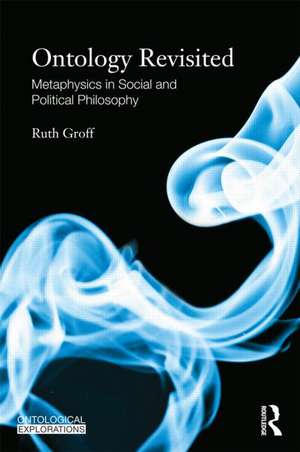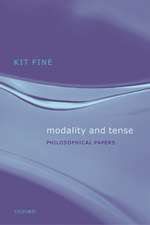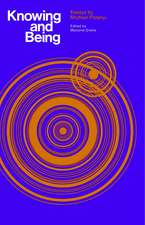Ontology Revisited: Metaphysics in Social and Political Philosophy: Ontological Explorations (Routledge Critical Realism)
Autor Ruth Groffen Limba Engleză Hardback – 22 aug 2012
"Ruth Groff has broken new ground in demonstrating the connection between social and political thought and the ontology of causal powers. Her account of the structure of Humean thinking about agency is excellent. Especially significant is the role that she assigns to Kantianism in the analysis that she develops. She moves effortlessly between contemporary metaphysics, political theory, critical social theory, and the history of modern philosophy, offering trenchant insights along the way into the work of thinkers ranging from Hume himself to Mill, Adorno, and Martha Nussbaum, and into debates over agent causation and emergence. There is even a discussion, in the final chapter, of Spinoza. This is big-picture philosophy at its best: rigorous and exacting at the level of detail; original, compelling and systematic in the whole." - Stephen Mumford, Professor of Metaphysics and Dean of the Faculty of Arts, University of Nottingham
| Toate formatele și edițiile | Preț | Express |
|---|---|---|
| Paperback (1) | 480.06 lei 6-8 săpt. | |
| Taylor & Francis – 19 mai 2014 | 480.06 lei 6-8 săpt. | |
| Hardback (1) | 1108.73 lei 6-8 săpt. | |
| Taylor & Francis – 22 aug 2012 | 1108.73 lei 6-8 săpt. |
Din seria Ontological Explorations (Routledge Critical Realism)
- 8%
 Preț: 425.29 lei
Preț: 425.29 lei -
 Preț: 340.38 lei
Preț: 340.38 lei -
 Preț: 326.49 lei
Preț: 326.49 lei -
 Preț: 295.64 lei
Preț: 295.64 lei -
 Preț: 379.07 lei
Preț: 379.07 lei - 28%
 Preț: 821.10 lei
Preț: 821.10 lei - 28%
 Preț: 817.51 lei
Preț: 817.51 lei -
 Preț: 488.33 lei
Preț: 488.33 lei -
 Preț: 461.86 lei
Preț: 461.86 lei -
 Preț: 480.83 lei
Preț: 480.83 lei - 18%
 Preț: 1058.43 lei
Preț: 1058.43 lei - 30%
 Preț: 937.61 lei
Preț: 937.61 lei -
 Preț: 438.14 lei
Preț: 438.14 lei - 17%
 Preț: 270.20 lei
Preț: 270.20 lei -
 Preț: 413.33 lei
Preț: 413.33 lei - 18%
 Preț: 1117.07 lei
Preț: 1117.07 lei -
 Preț: 464.54 lei
Preț: 464.54 lei -
 Preț: 365.91 lei
Preț: 365.91 lei -
 Preț: 145.32 lei
Preț: 145.32 lei - 18%
 Preț: 1058.69 lei
Preț: 1058.69 lei - 43%
 Preț: 213.77 lei
Preț: 213.77 lei - 43%
 Preț: 189.44 lei
Preț: 189.44 lei - 23%
 Preț: 339.31 lei
Preț: 339.31 lei -
 Preț: 446.53 lei
Preț: 446.53 lei - 15%
 Preț: 425.26 lei
Preț: 425.26 lei -
 Preț: 413.76 lei
Preț: 413.76 lei - 18%
 Preț: 1225.29 lei
Preț: 1225.29 lei - 29%
 Preț: 273.65 lei
Preț: 273.65 lei - 18%
 Preț: 1054.89 lei
Preț: 1054.89 lei - 28%
 Preț: 819.32 lei
Preț: 819.32 lei -
 Preț: 480.24 lei
Preț: 480.24 lei - 28%
 Preț: 823.08 lei
Preț: 823.08 lei - 30%
 Preț: 854.14 lei
Preț: 854.14 lei - 31%
 Preț: 331.35 lei
Preț: 331.35 lei
Preț: 1108.73 lei
Preț vechi: 1352.11 lei
-18% Nou
Puncte Express: 1663
Preț estimativ în valută:
212.22€ • 230.60$ • 178.38£
212.22€ • 230.60$ • 178.38£
Carte tipărită la comandă
Livrare economică 22 aprilie-06 mai
Preluare comenzi: 021 569.72.76
Specificații
ISBN-13: 9780415574112
ISBN-10: 0415574110
Pagini: 152
Dimensiuni: 156 x 234 x 10 mm
Greutate: 0.44 kg
Ediția:1
Editura: Taylor & Francis
Colecția Routledge
Seria Ontological Explorations (Routledge Critical Realism)
Locul publicării:Oxford, United Kingdom
ISBN-10: 0415574110
Pagini: 152
Dimensiuni: 156 x 234 x 10 mm
Greutate: 0.44 kg
Ediția:1
Editura: Taylor & Francis
Colecția Routledge
Seria Ontological Explorations (Routledge Critical Realism)
Locul publicării:Oxford, United Kingdom
Public țintă
PostgraduateCuprins
1. The Myth of Metaphysical Neutrality, 2. Hume: Custom as Metaphysical Necessity, 3. J. S. Mill: Humeanism and the Perfection of Distinctively Human Capacities, 4. Kant and The Frankfurt School: Freedom as Escape from the Transcendental Subject, 5. Agents, Powers and Events: Humeanism and the Free Will Debate, 6. Metaphysics and the Capabilities Approach: Martha Nussbaum, Political Liberalism and the Ideal of Metaphysical Neutrality, 7. Powers, Ontology and the Appeal to Spinoza
Recenzii
"Political theorists have often tried to bracket metaphysical questions about what kinds of things really exist; so far, however, they have only succeeded in reinforcing a pernicious, disabling Humeanism that denies the reality of all sorts of causal powers, human and non-human, individual and social. In Ontology Revisited, Ruth Groff lays bare the costs of this strategy of avoidance and lays out a fascinating alternative. Her elegant, propulsive argument will be challenging reading, in the best sense, for political theorists of many persuasions—from political liberals to those who have already taken one version or another of the ontological turn." - Patchen Markell, Associate Professor of Political Science, The University of Chicago
"Ruth Groff has broken new ground in demonstrating the connection between social and political thought and the ontology of causal powers. Her account of the structure of Humean thinking about agency is excellent. Especially significant is the role that she assigns to Kantianism in the analysis that she develops. She moves effortlessly between contemporary metaphysics, political theory, critical social theory, and the history of modern philosophy, offering trenchant insights along the way into the work of thinkers ranging from Hume himself to Mill, Adorno, and Martha Nussbaum, and into debates over agent causation and emergence. There is even a discussion, in the final chapter, of Spinoza. This is big-picture philosophy at its best: rigorous and exacting at the level of detail; original, compelling and systematic in the whole."
- Stephen Mumford, Professor of Metaphysics and Dean of the Faculty of Arts, University of Nottingham
"Groff does a brilliant job in such a short space of showing how an insidious Humean atomism has coloured and distorted so many issues in metaphysics and the philosophy of mind and action, and how an Aristotelian approach, almost universally ignored in analytic circles, can restore good sense to philosophical discussion in these fields. I found her discussion of emergentism towards the end of chapter 5 particularly thought-provoking and insightful, bringing out as it does the very different assumptions of analytic philosophers and social theorists about such matters, to the advantage – I think – of the latter."
- E. J. Lowe: Professor of Philosophy, Durham University
"Ruth Groff has written a very important book. She argues that the influence of Hume’s philosophy extends deep into social theory and has hampered its development. It has done so, she claims, mainly because Hume’s metaphysics, especially his event ontology and regularity theory of causation, are at odds with basic elements of the conceptual framework required for theorising about social issues. For example, the concepts of deliberate action and of having the relevant capabilities for living well in a modern society, are fundamental ones in social theory, and we clearly need a metaphysics that will accommodate them. Her immediate aim, she says, is to expose the pervasiveness, and perverseness, of Humeanism in social and political thought, and to document its influence in shaping discussions of issues concerning human agency and social causation. But her ultimate aim is to press the case for a revisionary metaphysics — a form of causal power realism that can serve as an adequate foundation on which to build."
- Brian Ellis, Professor of Philosophy, Emeritus, La Trobe University
"Ruth Groff has broken new ground in demonstrating the connection between social and political thought and the ontology of causal powers. Her account of the structure of Humean thinking about agency is excellent. Especially significant is the role that she assigns to Kantianism in the analysis that she develops. She moves effortlessly between contemporary metaphysics, political theory, critical social theory, and the history of modern philosophy, offering trenchant insights along the way into the work of thinkers ranging from Hume himself to Mill, Adorno, and Martha Nussbaum, and into debates over agent causation and emergence. There is even a discussion, in the final chapter, of Spinoza. This is big-picture philosophy at its best: rigorous and exacting at the level of detail; original, compelling and systematic in the whole."
- Stephen Mumford, Professor of Metaphysics and Dean of the Faculty of Arts, University of Nottingham
"Groff does a brilliant job in such a short space of showing how an insidious Humean atomism has coloured and distorted so many issues in metaphysics and the philosophy of mind and action, and how an Aristotelian approach, almost universally ignored in analytic circles, can restore good sense to philosophical discussion in these fields. I found her discussion of emergentism towards the end of chapter 5 particularly thought-provoking and insightful, bringing out as it does the very different assumptions of analytic philosophers and social theorists about such matters, to the advantage – I think – of the latter."
- E. J. Lowe: Professor of Philosophy, Durham University
"Ruth Groff has written a very important book. She argues that the influence of Hume’s philosophy extends deep into social theory and has hampered its development. It has done so, she claims, mainly because Hume’s metaphysics, especially his event ontology and regularity theory of causation, are at odds with basic elements of the conceptual framework required for theorising about social issues. For example, the concepts of deliberate action and of having the relevant capabilities for living well in a modern society, are fundamental ones in social theory, and we clearly need a metaphysics that will accommodate them. Her immediate aim, she says, is to expose the pervasiveness, and perverseness, of Humeanism in social and political thought, and to document its influence in shaping discussions of issues concerning human agency and social causation. But her ultimate aim is to press the case for a revisionary metaphysics — a form of causal power realism that can serve as an adequate foundation on which to build."
- Brian Ellis, Professor of Philosophy, Emeritus, La Trobe University
Descriere
Groff's argument runs counter to a familiar anti-metaphysical habit. Social and political philosophy, she maintains, is not as metaphysically neutral as it may seem. Even the most deontological of theories connects up with a set of philosophical commitments regarding what kinds of things exist, as a fundamental ontological matter, and what they are like. These are topics of interest not just to social and political philosophers, but to social scientists and to philosophers of social science as well.
















